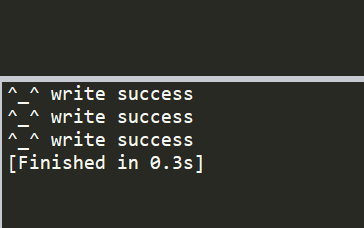源码:
1 import os
2 import json
3
4
5 class SaveJson(object):
6
7 def save_file(self, path, item):
8
9 # 先将字典对象转化为可写入文本的字符串
10 item = json.dumps(item)
11
12 try:
13 if not os.path.exists(path):
14 with open(path, "w", encoding='utf-8') as f:
15 f.write(item + ",
")
16 print("^_^ write success")
17 else:
18 with open(path, "a", encoding='utf-8') as f:
19 f.write(item + ",
")
20 print("^_^ write success")
21 except Exception as e:
22 print("write error==>", e)
23
24
25 if __name__ == '__main__':
26 # 保存的文件名
27 path = "test1.json"
28 # 案例字典数据
29 item = {"uid": "5bc05421vbjgj34hj9c7d83", "oss_status_code": 200,
30 "url": "http://www.51dev.com//FileUpload/news/202305/20230506212415342.jpg",
31 "updatedAt": "1970-01-18", "createdAt": "1970-01-18", "PID": "5b923c7vbcvbxcswrw342504b",
32 "_id": "5b98d052ed0cbe41","CID":"afdsfgasgfafghdgssdhh"}
33
34 s = SaveJson()
35
36 # 测试代码,循环写入三行,没有空行
37 for i in range(3):
38 s.save_file(path, item)
运行结果:

文件内容:


